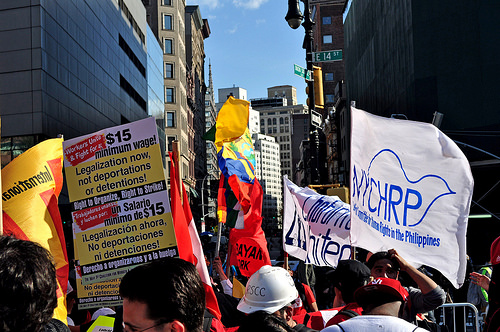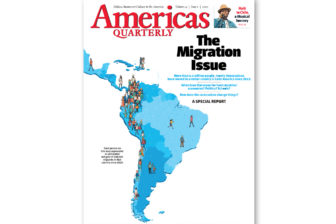Immigrant and workers’ rights activists and union members gathered in New York City last week to celebrate International Workers’ Day on May 1—also known as May Day.
Representatives from unions like Local 375 NYC Board of Education Employees (AFSCME) and the Coalition of Black Trade Unionists, and immigrant rights groups like New Immigrant Community Empowerment (NICE) and the Migrant Power Alliance participated in the march. They demanded the legalization of undocumented immigrants, an end to deportations and detentions, an increase in the minimum wage to $15 an hour, and contracts with full retroactive pay for all workers.
View the slideshow below.
A celebration of the working class by the international labor movement, May Day saw a revival in the U.S. in 2006, when hundreds of thousands marched in cities across the country to protest the Border Protection, Anti-terrorism, and Illegal Immigration Control Act of 2005 (HR 4437), which threatened to classify undocumented immigrants and people who assisted their entry into the U.S. as felons. The bill passed in the U.S. House of Representatives, but not in the Senate.
“May Day has been revived after years of being dormant, and we have to thank the immigrant struggle for that,” said Teresa Gutiérrez, co-coordinator for the May 1st Coalition since its New York revival in 2006.
But the struggle for immigration reform also faces an uphill battle. Since 2006, attendance at May Day events has decreased significantly, and many immigrant communities fear detention and deportation. “[In New York City,] the South Asian and Muslim immigrant communities have been devastated, families have been separated, and less people are active because their communities have been heavily impacted by deportations,” said Gutiérrez. “The fact that they come out at all is a big deal.”
This year, immigrant workers’ demands ranged from allowing undocumented workers to organize for better treatment in the workplace, to accountability for wage theft suffered by jornaleros (day laborers).
Participating immigrant groups included New York City-based worker collectives like the Laundry Workers Center and Hot & Crusty Workers—who have organized around the city to demand better treatment and higher wages from their fast food and service industry employers—and the Migrant Power Alliance, a collective of migrant rights groups launching a new campaign asking the city to stop all collaborations with Immigration and Customs Enforcement (ICE).
“Despite the deportations and the criminalization of immigrants across the country, we know that every May Day there will be a voice for immigrant rights,” said Gutiérrez, “and that shows that this movement is not going away.”
All photos courtesy of the author.







